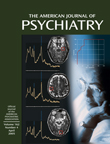Elevated Plasma Ghrelin Levels in Night-Eating Syndrome
Ms. A, a 27-year-old woman, reported that the first symptoms of night-eating syndrome appeared 1 year before she underwent our psychiatric examination. As in previous reports, administration of a selective serotonin reuptake inhibitor (citalopram, 100 mg/day) was started (3). A complete remission was obtained within 8 weeks. Medication was continued for another 8 weeks before withdrawal. About 8 weeks later, Ms. A described a relapse of night-eating syndrome.Her plasma ghrelin concentrations were measured by radioimmunoassay (Phoenix Pharmaceuticals, Belmont, Calif.) at three times (before treatment, 8 weeks later [during drug treatment and full remission], and finally, after relapse). Specimens were collected on all three occasions: every 20 minutes between 10 p.m. and 7:00 a.m. by a long catheter.Mean nocturnal ghrelin concentrations (10 p.m. to 7 a.m.) were 1051 pg/ml before treatment, 977 pg/ml 8 weeks later (during drug treatment and full remission), and 1013 pg/ml after relapse. The body mass index (kg/m2) of Ms. A was about 23.5 at all examinations.As control subjects we investigated three healthy women, 22, 23, and 32 years old, with body mass indexes of 21.9, 22.4, and 20.8 kg/m2. Their mean ghrelin concentrations were 372, 402, and 338 pg/ml, respectively.
References
Information & Authors
Information
Published In
History
Authors
Metrics & Citations
Metrics
Citations
Export Citations
If you have the appropriate software installed, you can download article citation data to the citation manager of your choice. Simply select your manager software from the list below and click Download.
For more information or tips please see 'Downloading to a citation manager' in the Help menu.
View Options
View options
PDF/EPUB
View PDF/EPUBGet Access
Login options
Already a subscriber? Access your subscription through your login credentials or your institution for full access to this article.
Personal login Institutional Login Open Athens loginNot a subscriber?
PsychiatryOnline subscription options offer access to the DSM-5-TR® library, books, journals, CME, and patient resources. This all-in-one virtual library provides psychiatrists and mental health professionals with key resources for diagnosis, treatment, research, and professional development.
Need more help? PsychiatryOnline Customer Service may be reached by emailing [email protected] or by calling 800-368-5777 (in the U.S.) or 703-907-7322 (outside the U.S.).

